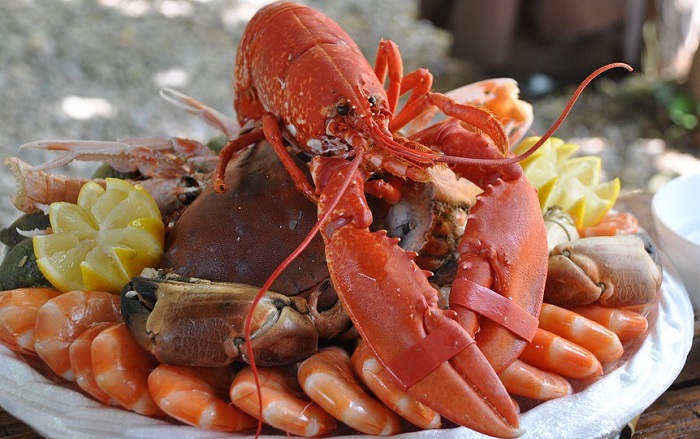Can vegetarians eat seafood? This question sparks a culinary conundrum that stirs the pot of ethical and nutritional debates. Dive into the depths of this topic as we explore the nuances of vegetarianism, seafood consumption, and the intricate relationship between them.
From the core principles of vegetarianism to the nutritional benefits of seafood, we’ll navigate the murky waters of dietary choices. Prepare your taste buds for a journey that challenges perceptions and uncovers the complexities of vegetarian diets.
Vegetarianism Definition
Vegetarianism is a dietary practice that involves abstaining from consuming animal flesh. It encompasses a range of dietary choices, each with varying degrees of restriction on animal products.
The core principles of vegetarianism revolve around ethical concerns for animals, environmental sustainability, and health benefits. Vegetarians believe that it is morally wrong to kill animals for food and that plant-based diets can provide all the necessary nutrients for optimal health.
Types of Vegetarianism
There are several types of vegetarianism, each with its own set of dietary restrictions:
- Lacto-vegetarianism:Consumes dairy products (milk, cheese, yogurt) but excludes eggs and meat.
- Ovo-vegetarianism:Consumes eggs but excludes dairy products and meat.
- Lacto-ovo vegetarianism:Consumes both dairy products and eggs but excludes meat.
- Veganism:The strictest form of vegetarianism, excludes all animal products, including dairy, eggs, honey, and gelatin.
Seafood Consumption: Can Vegetarians Eat Seafood

Seafood encompasses a diverse array of aquatic animals, including fish, shellfish, and crustaceans. It offers a rich source of essential nutrients, including protein, omega-3 fatty acids, and vitamins.
Consuming seafood has been linked to numerous health benefits, including reduced risk of cardiovascular disease, improved brain function, and enhanced immune system response.
Nutritional Value of Seafood
- Protein:Seafood is an excellent source of high-quality protein, essential for building and repairing tissues.
- Omega-3 Fatty Acids:Fatty fish, such as salmon and tuna, are rich in omega-3 fatty acids, which have anti-inflammatory properties and support brain and heart health.
- Vitamins and Minerals:Seafood provides an array of vitamins and minerals, including vitamin D, vitamin B12, iodine, and selenium, all crucial for various bodily functions.
Common Seafood Dishes and Preparation Methods
- Grilled Salmon:Grilled salmon is a popular and healthy way to enjoy seafood. It is typically seasoned with herbs and spices and grilled until cooked through.
- Steamed Mussels:Steamed mussels are a quick and easy seafood dish. Mussels are steamed in a flavorful broth until they open, indicating they are cooked.
- Ceviche:Ceviche is a Latin American dish made with raw seafood, typically fish or shrimp, marinated in lime juice and other seasonings.
- Sushi:Sushi is a Japanese dish consisting of vinegared rice combined with various seafood ingredients, such as raw fish, shellfish, or cooked eel.
Seafood in Vegetarian Diets
The definition of vegetarianism can vary, leading to differing perspectives on whether seafood is considered vegetarian. Some vegetarians strictly adhere to a plant-based diet, excluding all animal products, while others may include certain animal-derived foods such as eggs, dairy, or seafood.
Those who argue for including seafood in vegetarian diets often emphasize its nutritional value. Seafood is a rich source of protein, omega-3 fatty acids, and other essential nutrients. They contend that seafood can complement a plant-based diet and provide a balanced intake of nutrients.
Arguments Against Including Seafood in Vegetarian Diets, Can vegetarians eat seafood
Opponents of including seafood in vegetarian diets primarily cite ethical and environmental concerns. They argue that fishing practices can harm marine ecosystems, including overfishing, bycatch, and habitat destruction. Additionally, some vegetarians believe that consuming seafood goes against the principle of non-violence towards animals.
Ethical and Environmental Concerns Related to Seafood Consumption
The ethical concerns surrounding seafood consumption relate to the potential suffering and pain inflicted on marine animals during fishing practices. Environmental concerns focus on the impact of overfishing, bycatch, and habitat destruction on marine ecosystems. These concerns raise questions about the sustainability and ethical implications of seafood consumption.
Alternative Sources of Nutrition
For vegetarians who abstain from seafood, finding alternative sources of essential nutrients is crucial. Here are some viable options to consider:
Protein:
- Legumes (beans, lentils, chickpeas): Excellent sources of protein, fiber, and iron.
- Tofu and tempeh: Soy-based products rich in protein and calcium.
- Nuts and seeds: Provide protein, healthy fats, and fiber.
Omega-3 Fatty Acids:
- Flaxseed and chia seeds: Rich in alpha-linolenic acid (ALA), which the body converts to EPA and DHA.
- Walnuts: Contain high levels of ALA.
- Algae supplements: Provide EPA and DHA directly.
Other Nutrients:
- Iron: Found in beans, lentils, spinach, and fortified cereals.
- Vitamin B12: Available in fortified plant-based milk, nutritional yeast, and supplements.
- Iodine: Found in iodized salt and some seaweed varieties.
Practical Tips:
- Include a variety of protein sources in your diet to ensure adequate intake.
- Consider supplementing with omega-3 fatty acids if your intake from plant sources is insufficient.
- Consume fortified foods or supplements to obtain essential vitamins and minerals.
- Consult a registered dietitian for personalized guidance and meal planning.
Cultural and Personal Perspectives

Cultural and personal beliefs play a significant role in shaping attitudes towards seafood consumption. Traditions, religious practices, and individual preferences influence dietary choices, including the inclusion or exclusion of seafood in vegetarian diets.
Role of Tradition and Religion
Cultural traditions and religious beliefs can profoundly influence dietary practices. In some cultures, seafood is considered a staple food, while in others, it may be avoided due to religious restrictions. For example, in many Asian countries, seafood is an integral part of traditional cuisine, whereas in some Hindu and Jain communities, seafood consumption is prohibited due to religious beliefs.
Individual Preferences
Personal preferences also play a role in determining seafood consumption patterns. Some vegetarians may choose to include seafood in their diet due to taste preferences or perceived health benefits. Others may avoid seafood due to ethical concerns about animal welfare or environmental sustainability.
Social Stigma and Discrimination
Vegetarians who choose to exclude or include seafood may face social stigma or discrimination. In some social circles, vegetarians who consume seafood may not be considered “true” vegetarians and may face criticism or judgment. Conversely, vegetarians who strictly exclude seafood may be perceived as overly restrictive or dogmatic.
It is important to respect individual choices and avoid stigmatizing those who have different dietary preferences.
Conclusion (not for Kami)
This article has explored the complex relationship between vegetarianism and seafood consumption. We have discussed the various definitions of vegetarianism, the nutritional benefits and concerns associated with seafood, and the cultural and personal perspectives that influence dietary choices.
In conclusion, the decision of whether or not to include seafood in a vegetarian diet is a personal one that should be based on individual beliefs, health considerations, and nutritional needs. There is no right or wrong answer, and it is important to respect the choices of others.
Final Summary

The vegetarian landscape is a tapestry of ethical, nutritional, and cultural threads. Whether seafood finds its place on a vegetarian plate remains a question that dances between personal choices and societal norms. As we continue to unravel the complexities of dietary choices, one thing is certain: the pursuit of a balanced and compassionate lifestyle remains the guiding light for vegetarians worldwide.
FAQ Overview
Is all seafood considered non-vegetarian?
Generally, yes. Seafood, including fish, shellfish, and crustaceans, is derived from animals and therefore not considered vegetarian.
Can vegetarians get enough protein without seafood?
Absolutely! Plant-based sources like beans, lentils, tofu, and quinoa provide ample protein for vegetarians.
Are there any ethical concerns with consuming seafood?
Some vegetarians choose to exclude seafood due to concerns about overfishing, bycatch, and animal welfare.





Leave a Comment